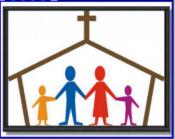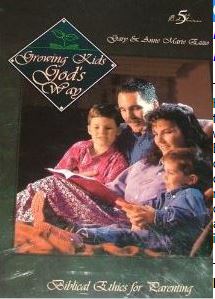
Philosophy of Christian Education:
Intentional Ordered Learning Process
Ephesians 4:11-16 says, "11 And he gave the apostles, the prophets, the evangelists, the shepherds and teachers, 12 to equip the saints for the work of ministry, for building up the body of Christ, 13 until we all attain to the unity of the faith and of the knowledge of the Son of God, to mature manhood, to the measure of the stature of the fullness of Christ, 14 so that we may no longer be children, tossed to and fro by the waves and carried about by every wind of doctrine, by human cunning, by craftiness in deceitful schemes. 15 Rather, speaking the truth in love, we are to grow up in every way into him who is the head, into Christ, 16 from whom the whole body, joined and held together by every joint with which it is equipped, when each part is working properly, makes the body grow so that it builds itself up in love."
This passage represents the Roof or Umbrella of our philosophy of ministry we desire to have at Hope Church. To help clarify it, First Elder Dean Shaw has put together an illustration that shows just how all the pieces fit together in the shape of a building (let's say it's a house).
|
|

Theology of the Family of Families
In order for God’s plan for the Family of Families to be properly fulfilled, the local church must be viewed as more than a social institution to be joined; it must be seen as an extended surrogate family (1 Tim. 3:14-15). When an individual comes to faith in Christ, he or she does not solely acquire a new Father – God; he or she also gains a new Family - the Church (Eph. 1:3-6, 2:19).
That being so, the Family of Families functions as a multi-generational gathering of believers that recognizes both young and old as its significant components. As such, members of the local church are to be mutually regarded as fathers and mothers, brothers and sisters, uncles and aunts, grandfathers and grandmothers, and esteemed with the same respect and support that one would his own biological family (1 Tim. 5:1-16). Older women are to assist younger women in establishing godly homes: loving their husbands and children, responding to the headship of their husbands, and managing their home in a way that pleases God (Titus 2:3-5). Older men, likewise, are to train younger men to be temperate, self-controlled, sound in faith, love, and endurance and to love their wives and children as Christ has commanded (Titus 2:2,6; Ephesians 5:25-33, 6:4).
As part of the Family of Families, believers are instructed to use their gifts for the universal benefit of its members and to make the regular meeting together for encouragement and instruction its standard of practice (1 Cor. 12:7; Heb. 10:25). Further, the local church must be characterized by its concern for the local community through acts of service and charity (Gal. 6:10; Phil. 2:4) and by its commitment to local and foreign missions (Acts 1:8). Functioning as it should, the Family of Families will serve as a powerful testimony to a dark and hurting world which so desperately needs the Light of Christ (John 13:35; Titus 2: 5, 8,10).
|
|

Theology of the Family and the Role of Fathers, Mothers, and Children
Scripture is clear that men are to be the head of their households and are responsible to lead and care for their wives and children as well as represent them before the believing community (Eph. 5:22-6:4). A man who does not manage his own household well is disqualified from serving as an overseer in the Household of God (1 Tim. 3:1-7).
Fathers are charged with the overall responsibility to both train and discipline his children (Eph. 6:1-4). His duty involves the impartation of wisdom to his children through regular instruction in God’s Word and worship in the context of the home (Prov. 1:8; 2:1-5; 3:1-4; 11-12; 5:1-2; 6:20; 7:1-2; 22:6; 1 Thes. 2:8-12). Fathers are warned against being too harsh with their children so that they won’t get discouraged (Eph. 6:4; Col. 3:21).
Mothers, likewise, also play a major role in the process of training and disciplining her children. Her responsibility, however, seems to include a softer element in that she is portrayed in Scripture as one who nurtures and loves tenderly (1 Thes. 2:7; Titus 2:4).
Parental discipline must be balanced. On the one hand, children must be kept under control and required to respect and obey authority, while on the other hand parents must be careful to avoid being heavy-handed and exasperating, causing their children to lose heart (Eph. 6:4; Col. 3:20-21; 1 Tim. 3:4-5). Moreover, parents must be intentional as they transition their children to adulthood to embrace the tenets of the faith as their own and continue in what they have learned and been taught from infancy. As children emerge into adulthood, parents must recognize and embrace the fact that others in the church(es) may play a significant role in that transition (2 Tim. 1:13-14; 3:14-16; 1 Thes. 2: 10-12; Prov. 1-9).
Children are commanded in Scripture to honor and obey both parents in the Lord, that they might experience God’s blessing of a life lived in the spiritual covering of their father and mother (Ex. 20:12; Eph. 6:1-3; Col. 3:20).
*In the case of single-parent households or where one’s spouse is not a believer, that parent must assume the primary responsibility to train and discipline his or her child(ren) in the “fear and admonition of the Lord (Eph. 6:4).”
|
|

Theology of Marriage and the Role of Husbands and Wives
The bond and covenant of marriage was established by God in Creation when God Himself said, "it is for this reason that a man will leave his father and mother and be united to his wife, and they will become one flesh (Gen. 2:24)." It signifies the mystery of the union between Christ and the Church and is intended to be a permanent and lasting display of the covenant-keeping grace of God (Eph. 5:31-32; Mark 10:6-9). The union of husband and wife, in heart, body, and mind is ordained by God for their mutual joy, for the help and comfort given one another in prosperity and adversity, and when it pleases God, for the procreation of children and their nurture in the knowledge and admonition of our Lord (Eph. 6:4).
There are clear instructions for both husbands and wives in Scripture. Husbands are told to love their wives as Christ loved the church; protecting them, honoring them, serving them, and being sensitive to their needs while giving care not to be harsh with them or taking advantage of the husband’s position or strength (Eph. 5:22-33; Col. 3:18-19; 1 Peter 3:1-7).
Likewise, wives are instructed to respond to their husbands’ leadership by following with a gentle and supportive attitude and by demonstrating respect for them as God’s designated heads of the family (Eph. 5:22-33; Col. 3:18-19; 1 Peter 3:1-7). Further, wives are to manage the overall daily affairs of their home, giving special attention to three areas: the functional operation of the home, caring for the needs of her husband and children, and demonstrating good deeds both within the Family of Families as well as toward the unbelieving community (1 Tim. 2:7-15; 5:9-10, 14-15; Titus 2:3-5; Prov. 31:10-31).
|
|

Theology of Singles, Widows, and the Elderly
The Family of Families is made up not only of nuclear families, but singles, widows, and the elderly as well. As such, a biblical understanding of each of these components must be investigated so that they can be effectively incorporated into the life of the church.
Guidelines given in Scripture to singles within the Family of Families seem to exalt those existing in that state as they are more able to focus on unfettered devotion to the Lord and to His Church (1 Cor. 7:8,17-35). One should remain single only when it is possible to be undistracted by temptations and desires for the physical union which is only possible through marriage (1 Cor. 7:1-7). Single men and women are under no obligation to marry, and neither are they sinning if they choose to marry (1 Cor. 7:36-38). The Family of Families becomes the family by extension for the single man or woman who is living outside the household of his or her parents. As such, single men and women should recognize those in spiritual authority as their “heads,” seeking to minister and grow under their leadership and counsel (Heb. 13:17).
The church’s commitment to the Family of Families concept has implications for elderly members who are not able to provide for themselves. As one would care for aging parents, the elderly must be honored and provided for when their own family either refuses or is unable to do so. Likewise, widows who have served their own families and the Family of Families well are to be financially supported if their families are unable or unwilling to support them (1 Tim. 5:3-16). The purity of the faith of the Family of Families is expressed in their care for those who are unable to care for themselves (James 1:27).
|
|
Resources for Family Worship
Bibles:
The Big Picture Bible by David R. Helm (Preschool).
Read-Aloud Bible Stories, 4 volumes, by Ella K. Lindvall (Moody Press,
1982, 1985, 1990, 1995) (Toddler).
The Child’s Story Bible by Catherine Vos (4 – 12 yr. olds).
ESV Children’s Bible, English Standard Version, (Crossway, 2005, 2008).
Bible Stories:
Discovering Jesus in Genesis: Covenant Promises for Covenant Kids by Susan Hunt.
Discovering Jesus in Exodus: Covenant Promises for Covenant Kids by Susan Hunt.
Big Truths for Little Kids: Teaching Your Children to Live for God by Susan Hunt.
Grandpa’s Box: Retelling the Biblical Story of Redemption by Starr Meade.
Scripture Memory:
My ABC Bible Verses: Hiding God’s Word in Little Hearts by Susan
Hunt (Crossway, 1998).
Truth and Grace Memory Books, volumes 1-3, by Thomas K. Ascol
(Founders Press, 2005).
http:www.navpress.com/product/9781576839973/.
Prayer:
I Can Say to God, I Love You by Carine MacKenzie, Prayer Board
Books series (Christian Focus, 2001).
My Thankful Heart by Sally Lloyd-Jones, (Tyndale, 2004).
Audio Bibles:
Inspired by the Bible Experience: Old and New Testament Audio CDs (Zondervan,
2006).
*a free audio version of the Bible is available for download at www.itunes.com
Music:
Seeds Family Worship ( www.seedsmusicstore.com)
Songs that Jesus Said: Scripture Into Music, by Keith and Kristyn Getty
(Getty Music, 2005) (Toddlers).
Awesome God by Sovereign Grace Kids (Sovereign Grace Music, 2004) (Preschool).
Hide the Word: Scripture Memory Songs, Volumes 1-8, by Mark Altrogge
(Forever Grateful Music).
Websites:
www.famtime.com (Family Time Training)
www.allprodad.com (Resources for Dads)
Catechisms:
Training Hearts, Teaching Minds: Family Devotions Based on the Shorter Catechism
by Starr Meade.
|
|
.jpg)
Resources and Media for Parents
Courageous Movie: Honor Begins at Home. Four men, one calling: To serve and protect. As law enforcement officers, Adam Mitchell, Nathan Hayes, David Thomson, and Shane Fuller are confident and focused. Yet at the end of the day, they face a challenge that none of them are truly prepared to tackle: fatherhood.
While they consistently give their best on the job, good enough seems to be all they can muster as dads. But they're quickly discovering that their standard is missing the mark. When tragedy hits home, these men are left wrestling with their hopes, their fears, their faith, and their fathering. Can a newfound urgency help these dads draw closer to God ... and to their children?
Filled with action-packed police drama, COURAGEOUS is the fourth film from Sherwood Pictures, the moviemaking ministry of Sherwood Baptist Church in Albany, Georgia. Riveted moviegoers will once again find themselves laughing, crying, and cheering as they are challenged and inspired by everyday heroes who long to be the kinds of dads that make a lifelong impact on their children. Protecting the streets is second nature to these men. Raising their children in a God-honoring way? That's courageous.
|
|

Father/Daughter First Date: Fathers are encouraged to bring their daughters on a very special "first date", discussing the biblical idea of purity as well as modeling the love and respect that is required in a God-honoring relationship. A First Date nightmight include dressing up, presenting flowers to his daughter, bringing her out for a fancy dinner, setting the standard for behavioral expecations, and presenting her with a *Purity Ring.
- Setting The Standard: This is a time for the father to express his deep love for his daughter while modeling for her the standard of behavior for any potential suiter (holding doors for her, pulling our her chair and seating her at the table, opening the car door, etc.).
- Reinforcing Value: A First Date is a wonderful way for a father to validate his daughter's worth to him. When dad takes time out of his busy schedule to spend with his daughter, she is esteemed as valuable in his eyes. Further, it provides a special opportunity for the father to express her value as a daughter of her Heavenly Father.
- Making Memories: A First Date will serve as a wonderful memory of the special bond that exists between a father and his daughter and will serve as a continual foundation for mutual love and communication.
*There are several options for purity rings on the market. Moreover, there are many possible applications for the giving of the purity ring. For example, a father might ask his daughter to trust him to guide her in her romantic pursuits, pray with her, and might incorporate her purity ring into her wedding ceremony some day (when he gives her away, he might take back the ring, etc.).
|
|

Parents' Daily Prayer Guide for our Hope Church Family
Monday:
Ask the Lord to completely surround your children with emotional, physical, and spiritual protection.
Tuesday:
Pray that the Lord will strengthen your children's faith and will fill them with a passionate desire to want to seek and know Him, His word, and His will.
Wednesday:
Ask the Lord to give your children godly wisdom in choosing their friends and peers and to give them strength and courage to boldly take a stand for what is right.
Thursday:
Pray that the Lord would renew your children's mind, helping them to remain pure in their thoughts and deeds.
Friday:
Ask the Lord to extend his blessing over the activities of your children, both academic and extracurricular, giving them alertness and clarity of mind. Pray also for encouragement in their defeats and humility in their victories.
Saturday:
Pray that your children will be sensitive and compassionate to the needs of others, and that the Lord will help them act in love, joy, peace, patience, kindness, goodness, faithfulness, gentleness, and self-control.
Sunday:
Pray for, and seek blessings for those who are in authority over your children, asking the Lord to give them wisdom and understanding as they instruct your children.
|
|

Growing Kids God's Way: Reaching the Heart of Your Child With a God-Centered Purpose
This series has gained national and international recognition for its highly practical approach and common sense application for today's parents. The Ezzos offer biblically based solutions that work. Growing Kids God's Way is the core curriculum of the Ezzo's presentation. Here the emphasis is on reaching the heart of children with the virtues and values that flow out of the character of Christ. The Ezzo's unique discipleship approach produces morally responsible childre who are kind, courteous, respectful, confident, sensitive to others, obedient to parents and whose lives are a compelling testimony of the Christian faith. The teaching is immensly practical and life changing.
The Growing Kid's God's Way DVD is available for parents to borrow - see Pastor Mike for a copy.
|
|

Reaching the Heart of Your Teen: Building Realtionships to Last a Lifetime
The is the fifth book of a six-part series that has gained national and international recognition for its immensly sensible approach to parenting teens. Reaching the Heart of Your Teen speaks to the issues: Why do teens rebel against their parents and family values? Is it due to hormones, a primal desire to stake out their own domain, a struggle for personal identity, or is it simply a neutral and predictable process of growth and development? The Ezzos look at the many factors that make living with a teenage either a blessing of a curse. From a biblical perspective, this series brings hope to families challenged by the pressure of living with an adolescent and encouragement to those who are fearful about the teen years. How you get to the pace of relational harmony and stay there is presented in this series.
The Reaching the Heart of Your Teen DVD is available to borrow - see Pastor Mike to sign it out.
|
|

Modesty Heart Check for Daughters
Start with a Heart Check…
“How does a woman discern the sometimes fine line between proper dress and dressing to be the center of attention? The answer starts in the intent of the heart. A woman should examine her motives and goals for the way she dresses. Is her intent to show the grace and beauty of womanhood? Is it to reveal a humble heart devoted to worshipping God? Or is it to call attention to herself and flaunt her beauty? Or worse, to attempt to lure men sexually? A woman who focuses on worshipping God will consider carefully how she is dressed, because her heart will dictate her wardrobe and appearance.” John MacArthur [emphasis added]
What statement do my clothes make about my heart? In choosing what clothes to wear today, whose attention do I desire and whose approval do I crave? Am I seeking to please God or impress others? Is what I wear consistent with biblical values of modesty, self-control and respectable apparel, or does my dress reveal an inordinate identification and fascination with sinful cultural values? Who am I trying to identify with through my dress? Is the Word of God my standard or is the latest fashion? Have I asked other godly individuals to evaluate my wardrobe? Does my clothing reveal an allegiance to the gospel or is there any contradiction between my profession of faith and my practice of godliness?
Before you leave the house, do a modesty check. (What are some things you should look for as you stand in front of your mirror?)
From the top…
When I am wearing a loose-fitting blouse or scoop-neck, can I see anything when I lean over? If so, I need to remember to place my hand against my neckline when I bend down. If I am wearing a button-down top, I need to turn sideways and move around to see if there are any gaping holes that expose my chest. If there are, I’ve got to grab the sewing box and pin between the buttons. The same check is needed if I am wearing a sleeveless shirt. When I move around, can I see my bra? If I do, I need the pins again. Am I wearing a spaghetti-strap, halter, or sheer blouse? Not even pins will fix this problem! Most guys find these a hindrance in their struggle with lust. It’s time to go back to the closet. Can I see the lace or seam of my bra through my shirt? In this case, seamless bras are a better option. More key questions: Does my shirt reveal any part of my cleavage? Does my midriff show when I raise my hands above my head? Is my shirt just plain too tight? If the answer to any one of these questions is yes, then I need to change my outfit.
Moving on down…
Does my midriff (or underwear) show when I bend over or lift my hands? If so, is it because my skirt or my pants are too low? Either my shirt needs to be longer or I need to find a skirt or pants that sit higher. I also have to turn around to see if what I’m wearing is too tight around my back side, or if the outline of my underwear shows. If so, I know what I have to do! And as for shorts – I can’t just check them standing up. I need to see how much they reveal when I sit down. If I see too much leg, I need a longer pair. The “sit-down” check applies to my skirt or dress as well. And I must remember to keep my skirt pulled down and my knees together when I’m seated. And speaking of skirts, watch out for those slits! Does it reveal too much when I walk? Pins are also helpful here. Before I leave, I need to give my skirt a sunlight check. Is it see-through? If so, I need a slip. Finally, I must remember to do this modesty check with my shoes on. High-heels make my dress or skirt appear shorter. And don’t forget – this applies to formal wear as well. A note on swimwear: It’s not easy but you can still strive to be modest at the pool or beach. Look for one-piece bathing suits that aren’t cut high on the leg and don’t have low necklines.
Modesty Check © 2002 Sovereign Grace Ministries
Republished in Girl Talk: Mother-Daughter Conversations on Biblical Womanhood
by Carolyn Mahaney and Nicole Whitacre (Crossway Books)
|
|
.JPG)
Internet Site Monitoring
Sites such as www.x3watch.com/ and others provide free monitoring of internet sites visited. Parents can place this software on their child's computer and receive regular notifications of the sites their child has visited. This helpful service provides additional accountability between parents and students and is one more tool to prevent sexual temptation.
|
|
|



